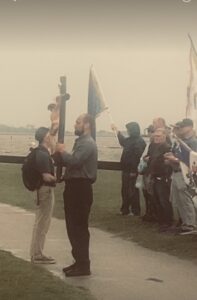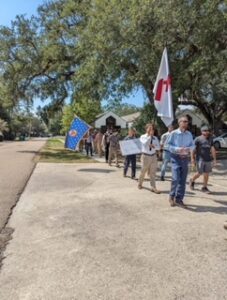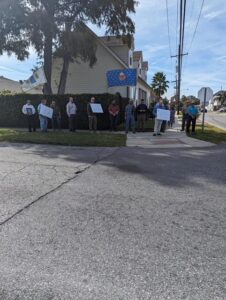Onward, To the Past
Last August I received an invitation to attend the inaugural meeting of La Nouvelle Vendée (LNV) , to be held in a low slung metal community building in Arnaudville, a village a few miles north of Lafayette, and on the western reach of the Atchafalaya Swamp. The promoters had gotten my email address from somewhere—probably from my searching for information about “the other” Christian theocratic movement: the Catholic version. So much has been written about the political aspirations of so many evangelical (previously “fundamentalist”) Protestants that, for me, their spiel had become quite predictable—a caricature of a sweaty parson bellowing fire, ash, and Hell from the back of the revival tent became a mental image which I can’t unsee. The simple childish moral platitudes, the cherry-picked scripture, the skeptical stance toward science and government, and the faulty and circular reasoning—all are being used as valid arguments for getting back to the Lord and getting back to the good life. It was no longer a challenge to debunk—too inane to rehash—nothing new to see here. Catholicism, on the other hand, had over a 1600-year head start on Protestant fundamentalism in building the intellectual theological foundation of Christianity, and consequently have a much larger and more complex inventory of challenging propositions to debate¹. But just like their Protestant cousins, even their elaborate apologia cooks down to faith.
La Nouvelle Vendée is a group of Catholic men operating from two commanderies², one in southwest Louisiana in the Lafayette area, and the other in rural St. Tammany Parish. It takes its name from the Vendée region in France, which is best known as a stronghold for its pro-royalist opposition to the French Revolution and its support of the long established monarchy/church regime, to the point of forming resistance fighting groups. Supposedly the Jacobin revolutionists committed a heinous massacre there. This led many to immigrate to the maritime province area of eastern Canada and New France, or Acadia. After the British conquered Acadia, the Vendéans decided they couldn’t live under the Protestant British and left for Louisiana, finding a place hospitable to growing their culture and religion. [This account is according to its website.]
Founder Ross McKnight, whose family and cultural roots are from the Lafayette are, now lives on a farm with two residences near Bush in St. Tammany Parish. He, his wife, and 5 children live in one house and his parents live in the other. The loss of the culture of the La Vendée region of France , and now possibly the loss of the culture of Cajun Louisiana—its language, its music, it oneness with the land , and, mainly, its loss of the guidance of religious rule–had McKnight at a point in life where he had to make a break from his previous job as an investment advisor. Together with his parents, they bought the homestead to escape “Americanism, secularism, consumerism, hedonism,” seeking to resume the culture of their French roots in the Vendée and the original settlements southwest Louisiana, and the idyllic pastoral life that brought man and beast together in harmony with God in His natural order in the world. Reminiscent Don Quixote, McKnight and his followers struck out publicly on a 21st Century crusade to recapture the chivalrous heroism commonplace in the Middle Ages and reproduced in the struggle for the holy alliance that was once his ancestral origin in the Vendée. Unlike Quixote, his campaign has been peaceful, leaving behind the suits of armor and the lances. The imposing windmill gods of secularism, modernity, liberalism and sexual deviance are enemy #1, which they hope to slay with prayer, other church liturgy, and the support of a few conservative politicians (of which there is no shortage in Louisiana these days.)
All well and good, right? Well, sure: one mainstay of the liberal republic we founded 250 years ago is that we are all equal and autonomous individuals, free to pursue our dreams and aspirations. One would think that religiously and culturally nostalgic souls overwhelmed by the demands of modern secular civilization might reason that a limited withdrawal from the debauchery of the godless rat race would be a good choice, like the Benedict Option, but not a complete withdrawal. After all, they have ongoing concerns in the world they have come to dread (like families, jobs, homes, and friends). Or better yet, just work within the system—the same system that allows you to express your grievances—to make changes you believe will be good for you and your family, and accept that overall lessening of the influence of religion in the world does not affect your own personal right to believe in and practice it as you wish.

The group was solemn Despite an ongoing celebration of life before them

LNV Troopers Strike a Pose in Front of Lake Pontchartrain for Queer Northshore’s Inaugural Pride Parade June 1, 2024

Demonstration at Covington Branch Library, September 2023

Demonstration Against a Headless Jesus Halloween Decoration, Bucktown La., 10/2023
But no, neither of these ideas works for the founders and followers of this renegade Catholic sect. From their “Who We are” page on its website:
“….La Nouvelle Vendée—that is, the current form of the Catholic counter-revolution—unites under the auspices of the Sacred Heart of Jesus those who desire the submission of the civil society of Louisiana to the rule of Christ the King.” (Italics mine)
With empathy for our neighbors in other states, we should be grateful that LNV’s desires are limited to Louisiana. Of more tangible concern to Louisianans now is how LNV’s desires are being ushered in through the backdoor of the Capital without being tagged as “Religion,” or pinned with a Sacred Heart badge. Bills penalizing women, the LGBTQ+ community, voting rights, and child workers welfare were all negatively focused and all passed and signed into law.
Thinking practically, LNV is not likely to achieve all of its goals—especially its main one, but it is getting a big assist from the current conservative government, and these polarized power shifts make predictions worse than lucky—sometimes.
But if their ruler of choice made it to the top, a thought experiment creates a paradox for your enjoyment. In the chance that LNV does achieve “submission of civil society to the rule of Christ the King” officially, like in an election. What then? Does King “Jerky” Jeff cede his power to Christ the King? Will he claim the election was rigged? Send his fans to the Capital?
Nah. Christ the King, in being the people person they say he is, will likely offer to share his authority with his predecessor, King JJ, who will also serve as the principle spokesman for the administration. So far, he has looked pretty good in rehearsals.
…for The Humanist Advocate
Marty Bankson, Ed.
June 10, 2024
¹ https://www.bc.edu/bc-web/centers/church21/programs/catholic-intellectual-tradition.htm
² In the Middle Ages, a commandery (rarely commandry) was the smallest administrative division of the European landed properties of a military order. It was also the name of the house where the knights of the commandery lived.
